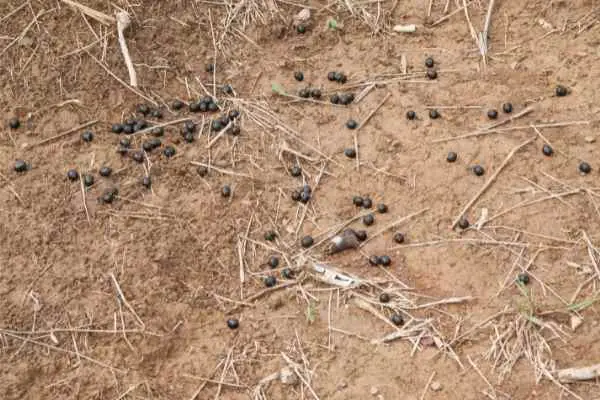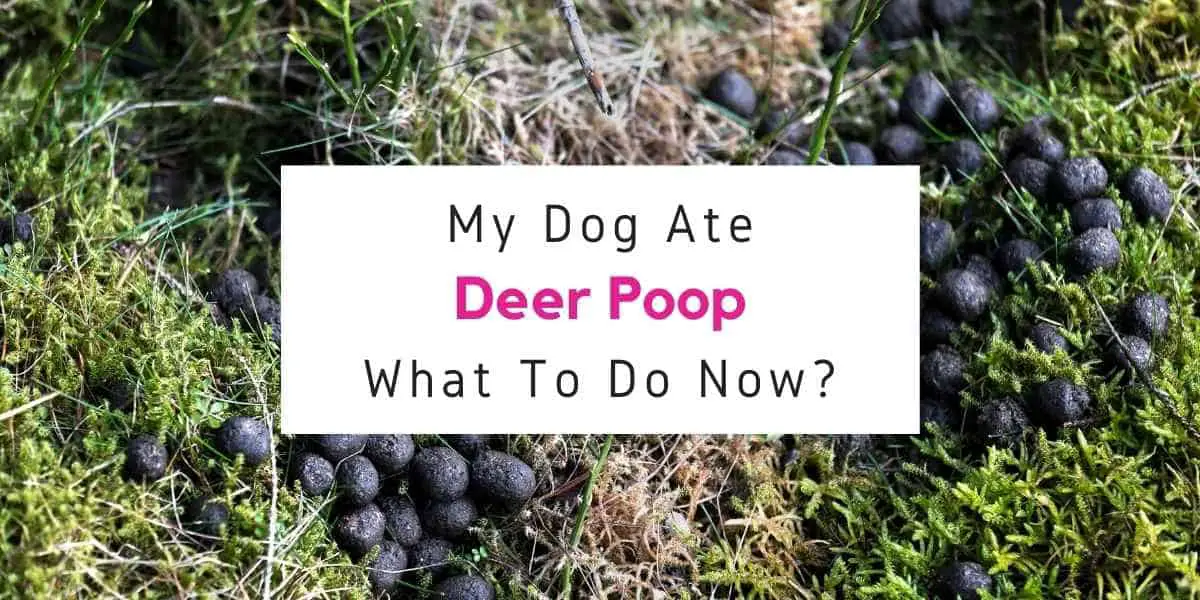Many dog owners have experienced this problem: their dog eats deer poop.
This can be a difficult situation to deal with, but there are many things you can do to help your dog get over the experience and prevent it from happening again.
In this article, I will share my insights on my own experiences as well as what other pet parents have done in similar situations.
- Why Do Dogs Eat Deer Poop?
- Is It Okay For Dogs To Eat Deer Poop?
- Can Dogs Get Sick From Eating Deer Poop?
- Can Dogs Pick Up Bacteria From Eating Deer Poop?
- Can Dogs Pick Up Viruses From Eating Deer Poop?
- Can Dogs Pick Up Worms From Eating Deer Poop?
- What To Do If Your Dog Ate Deer Poop?
- What Is Coprophagia In Dogs?
- Symptoms Of Coprophagia In Dogs
- How To Diagnose Coprophagia In Dogs
- Treatment Of Coprophagia In Dogs
- How To Prevent Your Dog From Eating Deer Poop?
- Conclusion
Why Do Dogs Eat Deer Poop?
1) Dogs often eat feces from their own species as an indicator of reproductive state or to share nutrients rich in protein and undigested fats.
2) Deer poop may also contain substances that dogs are attracted to, such as sugars and other substances excreted by the deer when they chew their cud. Dogs will sniff out this flavor sign over miles away and head into those areas. It is possible that these foods may even be under some sort of protection, such as behind fences or say around a doe deer giving birth, thus drawing the dog in with unequaled sureness!
3) The charcoal leftovers from burnt logs likely carry their own bait-ish flavors to entice hungry pooch.
Is It Okay For Dogs To Eat Deer Poop?

It’s okay to give your dog a few deer feces occasionally, but it would be best for them to get their nutrients from other sources.
Dogs don’t have the types of gut flora that can process raw meat and bone material, so if you feed your dog a diet largely made up out of wild animal scraps or offal, they will likely end up chronically malnourished.
The good news is that there are plenty of great food choices for dogs!
There are many unforeseen consequences when it comes to feeding dogs by-products from domestic livestock.
For example, they may be infected with parasites and toxoplasmosis which could spread while the dogs prance around in the yard.
Can Dogs Get Sick From Eating Deer Poop?
Yes, it’s not just deer poops that dogs can get sick from!
Dog owners don’t always realize this, but a dog’s stomach acid is much weaker than ours – about 10 times weaker.
This means that your pet can get seriously sick if they eat anything with high levels of bacteria in it.
Most poop contains some sort of bacteria because the anus is the most common bodily exit port for unwanted visitors and other nastiness.
So any animal poop, including deer poop, could contain harmful bacteria that your canine friend does not have the power to kill off all by themselves.
Can Dogs Pick Up Bacteria From Eating Deer Poop?
Yes. Dogs can pick up bacteria from eating deer poop because the bacteria in the stool of an animal can be transferred through contact with feces.
This includes mouth-to-nose, nose to mouth, hand to head, and hand to anus, such as when a pet licks its hind end after defecating.
Can Dogs Pick Up Viruses From Eating Deer Poop?
Viruses from the deer poop could get into the dog’s digestive system and infect them.
Animals contract different viruses from animal feces that they come in contact with, and we can then catch these viruses ourselves when we are near or handling these animals.
The way to prevent this is to make sure not to touch our hands after coming in contact with an animal’s waste as it will stay on the skin long enough to be transmitted if touched again later.
Also, when handling pets infected with a virus-infected poop, make sure not to touch anything else until you have disinfected your hands afterward so you don’t pass it on unknowingly.
Can Dogs Pick Up Worms From Eating Deer Poop?
Yes, they can.
Many feces-eating animals are hosts for a variety of intestinal parasites, one of the most common being roundworm (Toxocara Canis).
Although it’s unlikely that trout streams have significant populations of T.canis eggs, deer living in areas frequented by dogs or cats may harbor large numbers and therefore pose a potential risk to aquatic food chains.
Migrating waterfowl constitute another potential link between terrestrial and aquatic ecosystems.
What To Do If Your Dog Ate Deer Poop?

First of all, don’t panic. It is obviously best just to avoid this issue entirely by keeping your dog on a leash and off potential “deer poop” grounds.
Possible symptoms of illnesses from eating deer feces are diarrhea mixed with blood (which can cause red poop), cramps, bloating (and pain on either side below the ribs), fever (over 100 degrees Fahrenheit).
Address the dog’s digestive system with homeopathic remedies (i.e., for mild upset: milk thistle, Banogin; for moderate upset: Nux Vomica 30c; for serious episodes of diarrhea or vomiting: Ipecac).
If you’re at home, call the vet and ask them for their advice.
Raw meat may destroy the canine’s intestinal flora and need supplementation with probiotics.
Worms or parasites might need medication from your vet to eradicate them – and don’t forget about E Coli toxin release being a potential threat!
One way or another, they’ll affect his health so it’s best not to prevaricate for too long
Address contact skin surfaces by making sure they are well flushed and washed often.
Obtain information from people in the vicinity of the deer poop about whether or to what degree they had been in contact with it.
Exercise caution when eating the dog’s food just after he/she has eaten a meal that contains deer poop, and be sure to wash your hands well before handling human foods (i.e., if you are cooking both for humans and dogs).
What Is Coprophagia In Dogs?
Coprophagia, also known as dog poop eating, is very common in dogs.
Coprophagia can be caused by a deficient diet or stress.
Sometimes, patients just pick up this habit and it doesn’t have an identifiable cause.
It’s essential to rule out intestinal parasites like roundworms or Strongyloides because they require dry food that you can buy at the pet store and would make your pup go crazy with coprophagia that has no other obvious causes.
Diagnosis of parasitic infestations requires fecal examination for eggs under a microscope – usually only part of the worm develops an outer wall so it’s hard to notice these things which give them time to wreak havoc inside your pup’s intestine.
Symptoms Of Coprophagia In Dogs
Coprophagia is the act of eating feces.
This act can be performed by any number of animals, but most commonly manifests in dogs.
Some theories as to why some dogs engage in coprophagia are that they may crave a diet higher in fat or protein content and attempt to supplement this deficiency with their own feces; the other theory is that these dogs do not harbor intestinal parasites which might require them to consume orally-shed material for transmission; the third proposed reason might be as simple and innate as the pleasure derived from emesis causing stimuli (henceforth, arousal).
How To Diagnose Coprophagia In Dogs
Coprophagia is diagnosed through a physical examination.
The veterinarian may inspect the animal’s rear end and take x-rays to see if undigested food can be found in the stool.
Sometimes, because of parasite infestations or allergies, a veterinarian will do more testing such as fecal flotation tests.
A fecal floatation test is done by suspending smeared feces on the water in a laboratory test tube with salt added to create buoyancy in order for various organic materials (particles) that are present to float near the surface where they can be easily observed under magnification for identification by comparison with standard reference samples of different types of pathogenic organisms.
Treatment Of Coprophagia In Dogs
Treatment of coprophagia in dogs is usually carried out by administering a medication that makes the stool taste unpleasant to the animal.
Side effects may include nausea, vomiting, abdominal discomfort, and diarrhea.
Coprophagia can be classified into three categories: primary coprophilia (usually younger animals), compulsive coprophagy (geriatric or those with stress disorder), and obsessive-compulsive behavior associated with a medical condition.
Compulsions can be treated using medications such as Prozac for psychological problems associated with tamoxifen for medical conditions involving cancer or radiation.
Therapy methods are recommended before resorting to medicinal treatment strategies including techniques like operant conditioning programs and management of lifestyle.
This includes high-priority items like dissuading the animal from engaging in coprophagia and substituting a healthier diet of canned food or moist kibble.
Coprophagia is not an uncommon occurrence with dogs, but it can cause some serious health problems if left untreated.
How To Prevent Your Dog From Eating Deer Poop?
Poop belongs in the litter box, not on the lawn.
Next time you’re walking your pup, take a handkerchief with you and carefully wrap it around his mouth when he starts to get too close to something smelly.
It’s difficult to prevent your dog from sniffing poop – these animals have a very different instinctual response than humans do when near poop – but it doesn’t take much effort on your behalf to keep his paws out of it by carrying him away before they’re able to explore.
Thankfully, your dog should have a harder time finding deer poop during the fall when vegetation is scarce and winter when snow covers everything.
However, if you know your pup is apt to find it in the spring or summer months, there are some steps they can take to prevent this unpleasant behavior.
This whole process may take a few weeks of persistent effort on your part but once it has taken hold, there’s no reason not to leave “ The Deer Poop Patrol” home for good.
You’ll need canned pumpkin dog treats! (Make sure you don’t use any other pumpkin product). Dogs love them but they don’t taste like much so they usually keep searching for tastier snacks.
Begin breaking the treats into tiny pieces and sprinkle them over the poop.
The pumpkin will mask any odor that may remain from deer droppings, making it less attractive to your pup.
If you’re in an area where there are lots of trees with low branches, consider planting some catnip somewhere near the edge of your property line so Rover can enjoy a healthy snack without getting into trouble.
Conclusion
It’s never a good idea to let your dog eat poop, but in some cases, it can be inevitable.
I hope this blog post has helped you to understand what happens when your dog eats deer poop, and what steps you should take next.
If you have any questions or comments about the information in this article please mention them below!

